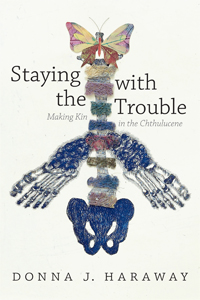Savage Minds welcomes guest blogger Cthulhu, Great Old One and Special Collections Librarian at Brown University.
When the puny mortals at Savage Minds invited me to review the latest work by Donna Haraway I was perplexed. After I had devoured the sanity of their pathetic messenger, I turned the book over in my tentacles. “Chthulucene,” eh? Was this meant to be a literary subversion of the Anthropocene, supplanting the implied anthropocentrism of that category with something alien and indifferent? And if so, was this really a wise move, politically speaking, when the purpose of the term was to draw attention to human actions that frequently remained hidden to those without the all seeing eyes of Yog-Sothoth? Needless to say, I was intrigued.

Full disclosure: Haraway and I are somewhat estranged. She never forgave me for guiding my cultists to infect Sumatran rat-monkies with a zombie virus (for more on this consult the 1992 documentary Dead Alive). Sure my methods are “controversial” but she and I have the same goal in mind: confronting our shared ecological crisis by addressing the problem of accelerating human population growth. Whereas she seeks to carve out the possibility that feminism can navigate the racist and eugenicist histories of limiting human reproduction, I advocate for a strategy of direction action, i.e. human sacrifice.